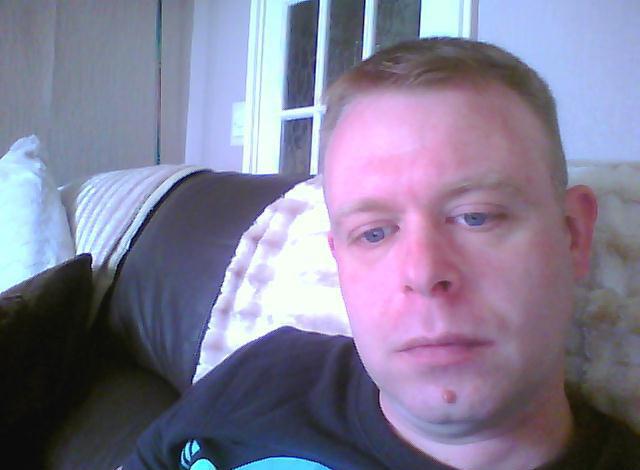Father dies from meningitis after doctors fail four times to diagnose ear infection
Andrew Broadhurst's pain was 'driving him mad', coroners court hears

A 39-year-old father died of meningitis after doctors repeatedly failed to diagnose an ear infection, an inquest has been told.
Andrew Broadhurst went to his GP four times after suffering from a blocked ear, headaches and problems with his sight.
Despite repeated examinations over the next three months, medics failed to spot the infection of his middle ear - the part of the ear that sits behind the eardrum.
After collapsing in the bath on 16 March he was rushed to hospital where doctors discovered he had swelling on the brain. He died the next day.
An inquest heard how Mr Broadhurst, a plasterer from Bartley Green, Birmingham, died from meningitis and encephalitis caused by an ear infection.
His distraught mother Brenda Partridge told Birmingham Coroner's Court her son's condition had been "driving him mad".
She said: "In November and December his ear blocked up, he started to get a lot of pain with his ears. "I bought him olive oil, he said 'I have pain in my ear.' He took some ibuprofen and paracetamol.
"I phoned 111 and they wanted to speak to Andrew and he said it was driving him mad, he was rocking with the pain, holding his ear. After using olive oil he had black gunk out of his ear, I said he has an infection."
He attended his GP surgery on 2 December and phoned the NHS 111 helpline nine days later.
He went back to the surgery on 18 and 25 January, and again on 7 March with symptoms including violent headaches and visual problems.
But his condition deteriorated rapidly and he was admitted to Birmingham's Queen Elizabeth Hospital on 16 March.
Describing the day before he died, Ms Partridge said: "I got up and got ready for work. Andrew said he felt rough and I said, 'well why don't you go back into bed.' I went back into the bedroom and heard Andrew being violently sick in the bathroom. He had positioned himself and let the shower water run down over his head.
"His arms were over his eyes - he looked at me and he was all glazed, saying, 'mum, mum, mum'. I just phoned 999."
Dr Kate Corrigan saw Mr Broadhurst twice in the months leading to his death.
She said: "He was seen on 18 January when I saw him for the first time. I was reassured by the examination. Mr Broadhurst said his ear felt blocked, an examination demonstrated wax. He was given a supply of olive oil ear drops to treat the earwax. Nothing was recorded about pain, just blocked."
Dr Corrigan saw Mr Broadhurst again on 8 March and referred him to Queen Elizabeth Hospital in Birmingham.
She said: "My working diagnosis was migraine, so we discussed that and I suggested, and he agreed, with onward referral to neurology. When I was writing the referral letter I made the decision to get blood tests done, it is usual procedure to call patients."
Dr Sylvia Chudley, who saw Mr Broadhurst on 20 February, told the inquest: "I knew there was something not right and also could see his headaches had been assessed by Dr Corrigan four weeks previously. He needed this to be sorted. I am really sorry we couldn't come up with anything else we could have done differently.
"We took it extremely seriously and we are very shocked at what happened to him."
Dr Abigail Ford, an intensive care consultant who treated Mr Broadhurst when he was rushed to hospital on 16 March, said: "The working diagnosis was meningoencephalitis. It is inflammation of the brain itself and meningitis surrounding tissues that cover the brain. It is viral or bacterial. Some of the bumps on the surface of the brain looked smoother which may show swelling of the brain. There was no abscess inside of the brain, no bleeding inside the brain.
"The lining round the brain showed up the scan consistent with somebody with meningitis. He had been started on broad spectrum antibiotics. His blood pressure was supported - that was a sign of worsening condition in his brain. A third scan on his brain at 12.40am on 17 March, I concluded the smoothing of the bumps were getting worse in keeping with swelling on the brain.
"I saw him about 8.40am - it was a very quick assessment - things had become a lot worse. His pupils weren't reacting to light. We confirmed there was nothing else we could do and I phoned Brenda and her husband. When I saw him in the morning, he was already brain dead. There was no benefit in surgery at that point."
Dr Declan Costello, a consultant at the hospital, said: "Andrew had a middle ear infection that had moved backwards towards the bone behind the ear, the mastoid bone. Because of closeness to the brain it is very easy to spread upwards and cause meningitis."
Senior Coroner Louise Hunt recorded a verdict of natural causes.
Join our commenting forum
Join thought-provoking conversations, follow other Independent readers and see their replies
Comments